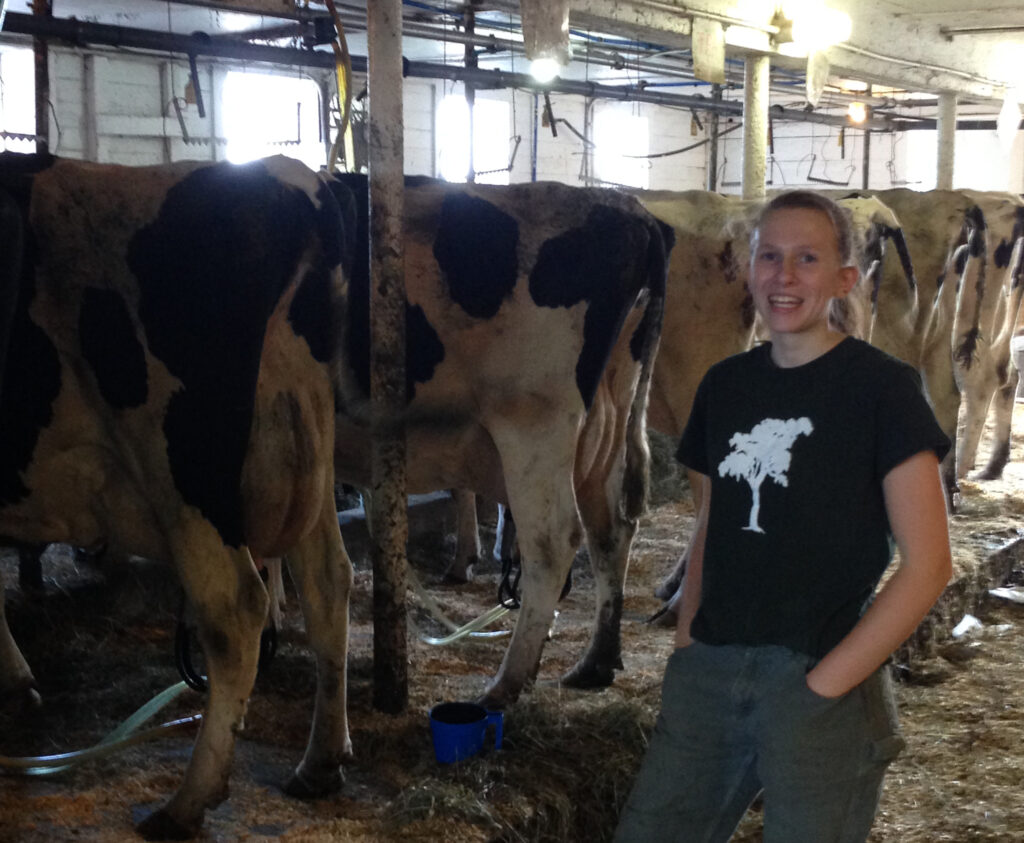
In the spring of my junior year, my dreams came true: I learned how to milk a cow. Since I was a small child, cows have always been my favorite animal. Perhaps a strange choice, one that my friends and family often questioned, but one that, nonetheless, I stuck with. There was something about these big, lumbering animals that I adored. So when I came to Putney I relished the day that I would get to work with these creatures. Instead of dreading it, like some of my peers, I couldn’t wait for my turn in the barn. I knew I wanted the one job that students either relish or absolutely despise: the job of milking the cows.
A barn crew is usually comprised of about seven students as well as one student barn head. Five of the normal crew workers do the jobs of mucking out stalls, feeding the cows and calves, clearing out gutters, and taking care of the animals in the small animal barn. The other two members are the milkers. On our training day when our crew boss asked who wanted to be a milker, my hand shot up without any hesitation.
I remember my first day, as I and my fellow milking partner were shown the ropes. We arrived earlier than the rest of the crew to set up the milk room: this included setting up the mechanical milkers (the machines used to milk the cows), washing out and sanitizing the tank (where all the milk goes after it comes from the cows), and hooking up the pipeline to the tank (so that the milk can flow from the machines to the tank). Once these tasks were done, we learned how to milk. We learned how to clean off the cow’s teats with warm, soapy water (a process that both cleaned them of any grime as well as let the milk down from their udders), how to check for mastitis by milking a couple squirts, by hand, into a cup and then checking for lumps, and finally how to hook up the machine to the pipeline and then to the cow and watch the milk flow out before removing the machine and dipping their teats in an iodine solution. All the steps got jumbled in my head and I was most certainly slow moving, but already, with my fumbly hands, I felt as though I was in my element and I was determined to get better. Each day I looked forward to my time in the barn, each day I learned a bit more and became a bit more skilled.
I felt at home among these big, stinky creatures that could potentially crush me at any moment. I enjoyed the repetition of the task at hand, the soft fur of the cows and their big blinking eyes. Of course, every day was not perfect and every cow was not perfect. Sometimes the cows kicked or a milking machine wasn’t working right. One time, my fellow milker and I forgot to put the cap on the milk tank after washing it and got through milking more than a third of the cows, before being notified of our mistake. This lost us gallons of milk and cost me a bucket’s worth of tears, but like I work to perfect my trigonometry skills in math class or my clarity in my essay writing, I worked through each bump I faced in my short career as a milker, determined to do as good of a job as I possibly could.
When all the cows were milked, we would clean up the milk room and set the milkers into their wash cycle, before turning off the light and leaving for the day. I would then exit the barn and walk to the locker room for a quick shower and a change of clothes. As I walked, I would often feel my body become filled with light. As I traversed the slightly damp soccer fields, in my barn clothes, which consisted of my student leader t-shirt, a bright pink crewneck sweatshirt for the chillier days, and forest green Carharts, I would breathe in my hay- and cow-scented self amid the smell of the clean air and muddy grass. I would turn my face to the clear blue sky, or the cloudy sky, or the rainy sky and smile, feeling the universe embrace me. Once I made it back to the locker room I would be brought back to the reality of life. There would be the yelling of freshman boys and the squeaking of their sneakers as they played a game of pick-up basketball on the court, somewhere someone would be playing loud rap music as they ran on the treadmill, and in the distance, there would be the screeching laughter of friends on the fieldhouse couches. I would walk into the girls’ locker room thankful to be alone and slip off my stinky armor, double bagging it trash bags so as to conceal the stench before tossing it in my locker. I would then move into the shower where I washed off the cow poop, stench, and that signature smell of sunshine, remembering the hour or so of refuge I found within the barn walls.
Milking was not simply a task, not simply something to get through or a credit to fill, and it was not simply a dream come true either. Milking was hard, stinky, rewarding work, but most importantly it was a job that made me leave the red and white, curving barn each day smiling, saying, “This is where I am meant to be.”

